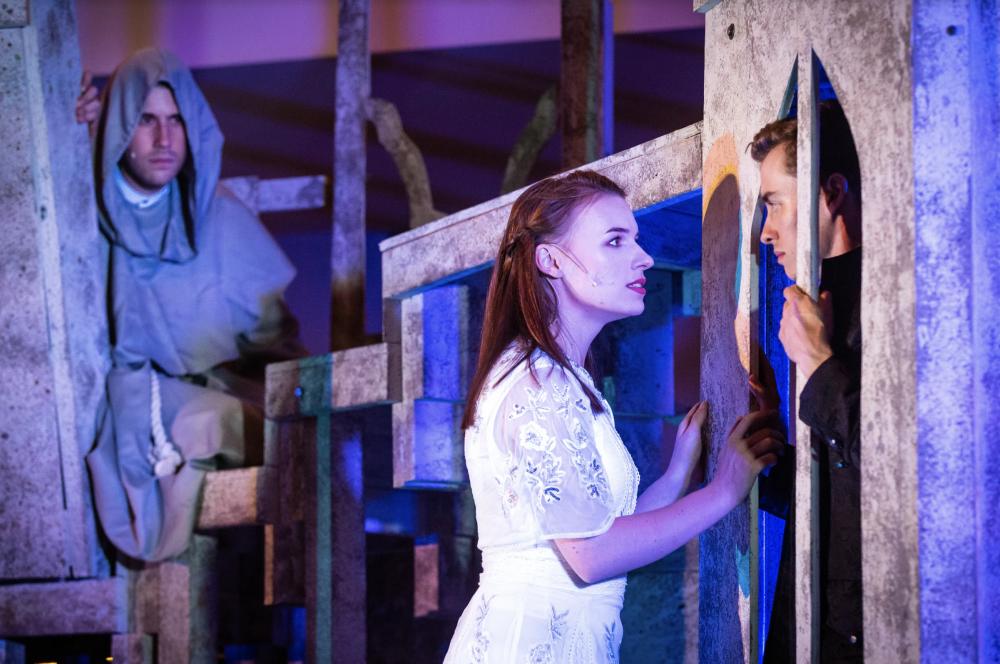“Thy head stands so tickle on thy shoulder that a milkmaid, if she be in love, might sigh it off.”
–Lucio to Claudio in Shakespeare’s “Measure for Measure”
Talk about staying power. The enduring relevance of William Shakespeare to current events well into a new millennium from his time, just more than half-way through the last, is an amazement. In dialogue from “Measure for Measure” (circa 1603-04) performed with impassioned zeal and due respect for its source by the Brown Box Theatre Project, we hear lines spoken today by both the accused and his accusers in #metoo sexual harassment/assault cases. He: “Who will believe you?” She: “No one will believe me.”
“He” is Angelo, cousin to the Duke of Vienna, who’s taken leave from his royal duties. Or has he? “She” is virgin novitiate Isabella, who on the cusp of taking her convent-for-life vows has learned that her brother, Claudio, is sentenced to beheading for the crime of lechery. It is the penalty prescribed by law. But the duke, a law-and-order moderate, has not ruled with a tight fist. He notes, in turning his reign over, temporarily, to Angelo, that his subjects are growing slack in moral conduct.
 When Isabella, granted an audience with Angelo, beseeches him to spare her brother, he steadfastly refuses. That is, until he turns from his desk to gaze upon her. Stunned by her beauty, Angelo proposes a remedy that amounts to a proposition. He will lift the death sentence if Isabella will “lay down the treasures of your body”—with him, of course.
When Isabella, granted an audience with Angelo, beseeches him to spare her brother, he steadfastly refuses. That is, until he turns from his desk to gaze upon her. Stunned by her beauty, Angelo proposes a remedy that amounts to a proposition. He will lift the death sentence if Isabella will “lay down the treasures of your body”—with him, of course.
Isabella flees in horror to inform her brother that she cannot save him by this means. When he suggests it is not a sin to sin under such duress she flees in equal horror, while impregnated Julietta, the young woman with whom Claudio fornicated, lingers somberly by his cell. Comforted by a friar who is instead the duke in disguise—spying on the rule of his cousin—Isabella flinches at the offer of a work-around involving Marianna, betrothed to Angelo but spurned after losing her dowry.
Young professionals mostly a few years or less out of college, the cast is, for the most part, spot-on in each role, crisply directed by Kyler Taustin. Imposingly tall Chris Kandra strikes a royal pose as the duke, haughty yet approachable in his stage manner while Sarah Boess embodies the play’s emotional core with a convincing range from anguish to anger. She’s still recovering from shock as the lights go out—the end. Drew Cleveland presents a desperately bewildered, respectably clean-cut Claudio, making his sentence seem all the more merciless. Spencer Parli Tew as Angelo, the hypocritical heavy, oozes hubris while also allowing a glimpse of conscience in tortured soliloquies. Aislinn Brophy as Marianna and Ivy Ryan as Julietta bring victimization of women to glum witness. For his sharp comic relief as Claudio and Isabella’s friend, Francis Xavier Norton’s Lucio is found guilty of impertinence.
Though “Measure for Measure” is by any measure a drama, its ending is oddly typical of Shakespeare’s comedies.
Framing and embroidering this ambitious production is a grand ecclesiastical set by Abby Shenker and gilded-royal to religious-garment costumes by Chelsea Kerl.
Well-dressed and well-played this “Measure for Measure” is tailored for provocative present-day pertinence.
Boston-based Brown Box, which tours the Delmarva peninsula each May and September, brings its free Shakespeare-in-the-park to St. Michaels Saturday night.
Steve Parks is a retired theater critic now living in Easton.
Shakespeare’s “Measure for Measure”
Saturday, Muskrat Park, 207 Willow Green St., St. Michaels
Sunday, Pemberton Hall lawn, 5561 Plantation Lane, Salisbury
Wednesday, Teackle Mansion lawn, 11736 Mansion Lane, Princess Anne
Thursday, Northside Park, 200 125th St., Ocean City
Sept. 20, Exmore Town Park, 3386 Main St., Exmore, Delaware
Sept. 21, Lewes Public Library lawn, 111 Adams Ave., Lewes, Delaware
Admission: Free, bring lawn chairs or blankets, brownboxtheatre.org



Write a Letter to the Editor on this Article
We encourage readers to offer their point of view on this article by submitting the following form. Editing is sometimes necessary and is done at the discretion of the editorial staff.